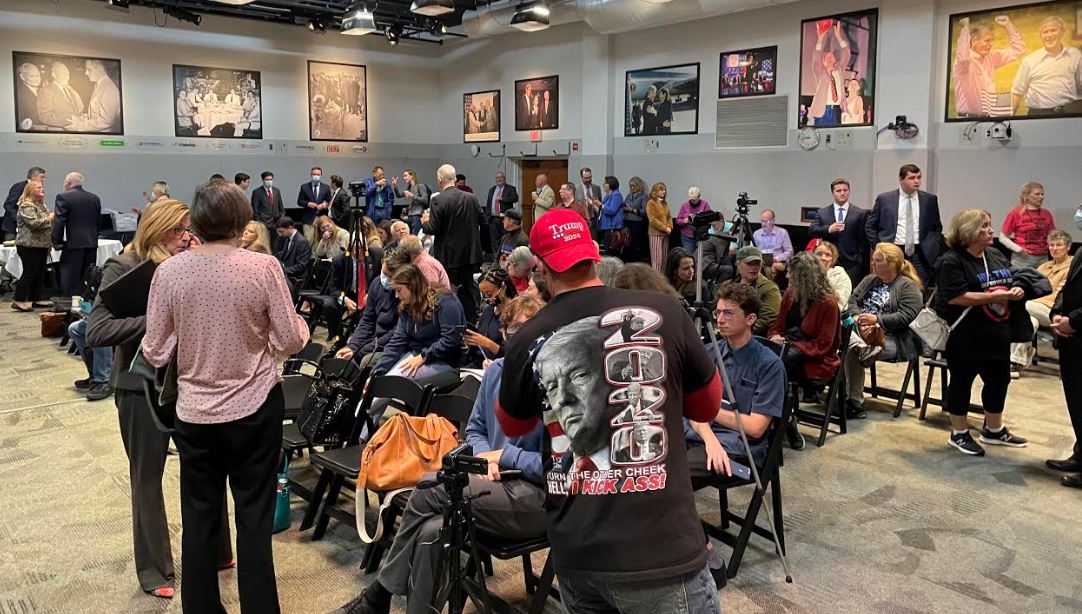By PAULA TRACY, InDepthNH.org
CONCORD – Tabled federal contracts that would build out the state’s vaccine program do not bind the state’s powers to federal mandates, Attorney General John M. Formella told Gov. Chris Sununu in a memo on Thursday.
Sununu asked Formella for a legal opinion after criticism that the state would give up controls allowed under the Constitution by accepting the $27 Million in federal grants.
Andrew Manuse, a former state Representative who heads RebuildNH, a group that opposes the contracts and federal vaccination mandates, said, “I totally disagree.” Manuse said the state needs to stop signing federal contracts with such language.
RebuildNH is not calling for a protest when the Executive Council meets next Wednesday as it did two weeks ago when a group of protesters became so loud and menacing that the council meeting was canceled. Manuse said those who were unruly were not part of his organization.
The next Executive Council meeting will be Wednesday at Police Standards and Training in Concord at 10 a.m.
Sununu said the language the opposing organizations are concerned about is “boilerplate” and he would never agree to support any conditions in which the state would give up controls allowed in the state Constitution. Sununu supports the two tabled Department of Health and Human Services contracts that include $27 million in federal funds to bolster the state’s vaccine program.
Formella noted the governor agreed to waive the attorney-client privilege as applied to the memo and the associated exhibits he sent to the press.
Formella said the most important points are that the referenced language appears in items that the Governor and Executive Council have already approved and is likely to appear in future contracts and it “does not bind the state to any broad and sweeping federal mandates because the language only applies to a narrow set of guidance and directives, and the Constitution limits the federal government’s ability to use the referenced language to bind the state to any broader set of guidance and directives.”
The five-member New Hampshire Executive Council has been receiving a significant amount of mail on the subject.
By Wednesday at 2:30 p.m. the council received 1,088 emails urging it to vote no on the contracts, four to vote yes and one which did not specify a choice, said the council’s executive assistant, Meagan Rose.
The governor said the contracts if accepted would do things like support public health departments in Manchester and Nashua so first responders can continue to get their COVID-19 booster shots, fund call centers to answer questions about vaccines, store and ship supplies and pay wages for 13 full-time temporary positions, using no state taxpayer funds.
But opponents say just agreeing to take the federal money may tip the power to the federal government and fly in the face of state sovereignty contained in the state Constitution.
Republican Executive Councilor Joe Kenney of Wakefield, who serves District 1, said he and many of his North Country constituents feel the governor should not have canceled the last meeting.
In an email to InDepthNH.org, he wrote, “I think overwhelmingly constituents felt that the governor should have kicked out the agitators and conducted the meeting. If a small mob is going to dictate official state government business, then they will try it again.”
Democrats also roundly criticized the governor, but for other reasons.
They claimed he bore a brunt of the blame for creating a climate for such vitriol by coddling anti-vaxxers.
Of concern to RebuildNH is the language that includes the state must comply with future directives.
In his analysis, Formella said: No. The quoted language is limited to guidance and directives as “applicable to the award” and refers to a very narrow class of guidance and directives. The currently issued guidances are clarifications of existing grant requirements and do not impose new conditions.
In addition, federal grant conditions must be unambiguous, and the United States Constitution places significant limits on the federal government’s ability to utilize funding conditions to require the States to adhere to federal directives, Formella said.
Formella noted there would be strong legal grounds to challenge any guidance or directive that created broadly sweeping new and different conditions, such as a vaccine mandate or quarantine provision.
| A copy of the memo and corresponding exhibits can be found: https://www.doj.nh.gov/news/2021/20211008-covid-grant.htm |





